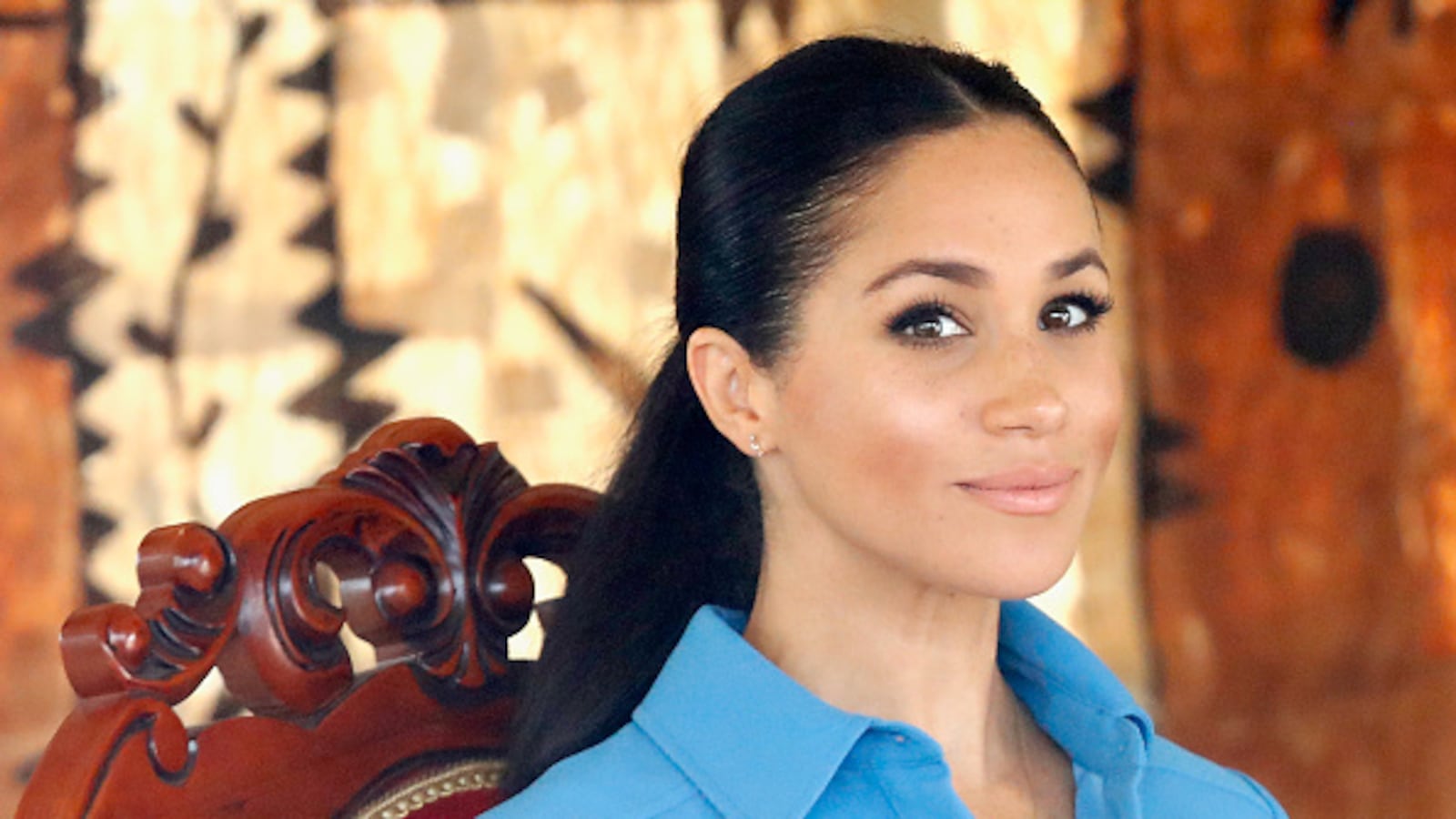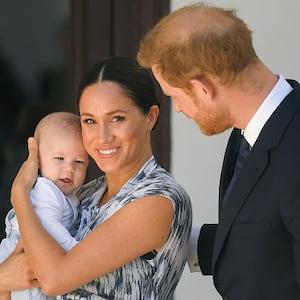That Meghan Markle is not a huge fan of the British royal family’s way of doing things is a reasonably well-documented fact, and her new illustrated rhyming book, The Bench, published just four days after the birth of their daughter, a coincidence which must have delighted the publishers, can easily be read as a tract in which she schools the Windsors on one crucial issue: child-rearing.
<p><em>If you love The Daily Beast’s royal coverage, then we hope you’ll enjoy The Royalist, a members-only series for Beast Inside. </em><em><a href="https://www.thedailybeast.com/membership?via=membership_page_inline_link&source=inline_link_royalist">Become a member</em></a><em> to get it in your inbox on Sunday</em>.</p>
Let’s just say it wouldn’t be a complete surprise were one to discover that at one stage Meghan had given this volume a working title like: “How the Windsors Should Have Brought Up Their Kids If They Didn’t Actually Want Them All to Be Totally Fucked Up.”
As even the most ardent royalist must admit, for a family so heavily invested in the concept of turning out quality offspring, the royal family have traditionally handled the whole area badly.
Prince Charles complained his parents were “emotionally distant” and that his father Prince Philip was “harsh,” hectoring” and overly sensitive. Prince Harry recently told Oprah that Charles told William and him they would have to “suffer” because he did. Going back a bit, Ethelred the Unready was beaten by his mother with candles, as The Daily Beast’s Clive Irving recently reported.
George II (who ruled from 1727-1760) and his wife Caroline, hated their eldest son Frederick so much that they banished him to Kew in West London (truly awful—he died before acceding, but of an embolism, not because of Kew). Victoria loathed her eldest son, the future Edward VII, holding him personally responsible for the death of her beloved Albert in 1861 after he visited the wayward heir to reprimand him for fast living, and caught a lethal chill in the rainy walk they took to make amends.
So, although Will and Kate seem like nice parents, only a fool would take parenting tips from the queen.
Enter Meghan Markle.

"A copy of "The Bench", a children's book written by Meghan, Britain's Duchess of Sussex, is displayed at a Waterstones store in London, Britain, June 8, 2021.
Henry Nicholls/ReutersOne of the things we know Meghan really hates is the very British “stiff upper lip” attitude to life in which all emotional tendencies and outbursts, be they of misery or joy, are kept strictly buttoned down.
In her now famous interview in Africa with ITV’s Tom Bradby, which gave the first glimpse of the chain of events which ultimately led to Harry and Meghan leaving the royal family, Meghan said, “I really tried to adapt this British sensibility of a stiff upper lip, I really tried, but I think that what that does internally is probably really damaging.”
Her new book can be seen in many ways as a very short (she reads the $7 audio version of the book in 2 minutes 48 seconds) rejection of the restrained ethos so beloved of the Windsors.
Meghan’s book is populated by a revolving cast of fathers and sons, with one set bearing a marked similarity to Harry and Archie. These duos sit on benches, which could just as easily be in the garden of a $14 million Montecito home as a public park, and emote to each other.
In one picture, a father and son duo wear pink tutus while performing ballet poses. The verses read: “You’ll love him. You’ll listen. You’ll be his supporter.” This is a sweet and valuable message of acceptance in a book otherwise distinguished by its blandness.
Alongside a picture of a father fixing his kid’s broken toy dinosaur, Meghan has written: “When life feels in shambles, you’ll help him find order.”
An image of a kid waiting for a bus sobbing on his father’s knees comes with the words: “He’ll feel happiness, sorrow, one day be heartbroken. You’ll tell him ‘I love you,’ those words always spoken.”
The book can also be seen as a possible piece of commentary on the difference between how Harry and Meghan intend to bring up their kids to how Harry was brought up in this book. One scene shows a dad observing his son on a trendy balance bike (all the rage amongst competitive parents these days) accompanied by the line, “He’ll learn to ride a bike as you watch on with pride.”
Talking to Oprah Winfrey, Harry said, “The highlight for me is sticking Archie on the back of a bicycle in his little baby seat and taking him on a bike ride, which is something I was never able to do when I was young.”
(Unfortunately for Harry’s credibility, photographs emerged of Harry riding on the back of Prince Charles‘s bike in 1990 and being pulled in a wagon attached to his fathers bicycle in 1988.)
It’s easy to laugh, and many have, The London Times among them which described the story as being “so lacking in action and jeopardy you half wonder if the writing job was delegated to a piece of furniture.”
While the messages of the book—accept your kids for who they are, encourage them, comfort them, love them and tell them you love them—cannot be faulted, The Bench is unlikely to win Meghan the children’s laureateship.
Roald Dahl said that people often decided to write a children’s book because they thought it would be easy, but they were dead wrong. “I don’t think there’s any question that to write a children’s book of comparable quality to a fine adult novel or story, is much more difficult," he said. Judging by the evidence of this well-meaning but rather one-dimensional book, this might be one lesson that Meghan still has to learn.
Equally, it would be fair to say that after 1000 years of royal screw-ups isn’t it time to try something—anything—different? Can anyone really disagree that the royal family’s seeming inability to do simple parent stuff like this, such as saying, “I love you son, I’m proud of you” is a major contributory cause of their epic dynastic dysfunction?
As hard as it is not to read this book as a critique of the Windsor style of parenting, it’s equally hard not to read it as a staggering takedown of the lousy British weather that Meghan had to endure for well over two years—and the sparkling Californian sunshine in comparison.
By contrast, in Prince Charles’s most famous contribution to the canon of children’s literature, The Old Man of Lochnagar, the plot revolves around a central character living in a cave in the wind swept hills of Scotland, desperately trying to heat up enough hot water to have a bath.
The old man accidentally has a cold bath at one stage and screams, which could be read as subconscious expression of Charles’ rejection of his father’s ideal of toughness, as epitomized by his lionization of the cold bath regime at his school, Gordonstoun.
In Meghan’s world in The Bench it’s always warm, with clear Californian skies at night in which you can see shooting stars. Being a parent, in this book, is at least partly about harnessing that delight.
But then open-hearted parenting seems to be much easier to do when the sun is shining, it’s really warm, and everyone is wearing a T-shirt. There is not a drop of rain to be seen on the pages of The Bench.







